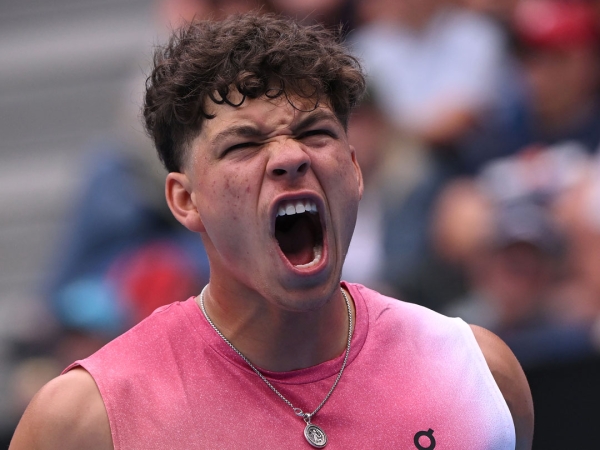Greetings from my first tennis tournament and first Grand Slam, Australian Open 2025.
I’ve prefaced nearly every conversation I’ve had at Melbourne Park over the past three weeks with “I’m new to tennis”. It’s both an admission and, if I’m being entirely honest, a tactic.
I’m not a novice to international sports, having made a career out of reporting from global tournaments like the Tour de France and Olympic Games. There were some things at AO 2025 I instantly identified with, others that challenged what I knew about the psyche of athletes who compete at a world level, and lessons, like the big business a major is.
Tennis is comprised of people deeply passionate about the game. In the first press conferences in the lead-up to the tournament, it was difficult to get a question in, with a moderator selecting the raised hands of trade media he or she could identify by name. The conferences for print press were timed to about 10 minutes and the pace of them was always different. Tennis insiders, for example, say Novak Djokovic gives longer answers so he must face less questions and can ultimately conserve more energy.

The first few I missed out on a question, then I became “girl in the green dress”, when I asked Aryna Sabalenka what kept her motivated on the court. Part of it, she said, was her attentive team, a group of men who rose to their feet every time she won a game against Madison Keys, the American who ultimately denied the defending champion a chance of a three-peat in the women’s singles final.
Sidenote: I absolutely loved how all the elite female players were unapologetically feminine and still so fearsome, in their own unique ways, on the court. Sublime.
But come Ben Shelton’s press conference, after his quarterfinal win over Italian practice partner Lorenzo Sonego, I got the first question following an opener from the moderator who addressed me by my name.
In the words of Shelton, “COME ON!!”

The beauty of tennis, like other international sports I’ve had the pain and privilege of reporting on, is that it brings people from different countries, cultures and backgrounds together. That’s addictive. Melbourne Park is positioned right next to the hallowed turf of the MCG – Australia’s coliseum. Most local sports reporters would kill to converge there and cover the AFL, NRL and cricket games it hosts. Special as the ‘G is, when your choice is that versus continents for me it was not even a decision. Maybe that’s why I’m still renting. I digress. Whatever. Worth it.
I felt commentator Garry Wilkinson’s heartbreak when he said he’d miss the people most as he contemplated retirement – at 83. His AO record is older than Djokovic.
And I understood exactly what Australian Matthew Romios, who competed in the men’s doubles, meant when he said tennis was less an occupation and more a lifestyle, travelling from country to country, tournament to tournament, striving to be your best, the best.
There were the challenges.
Taylor Fritz’s coach, Michael Russell, saying diet was important but that his American protégé’s could be better was admittedly surprising. I’m used to sportsmen and women following an app that tells them what chef-prepared meal to have during competition and how much of it to eat down to the gram. The fact competitors can buy pizzas and burgers next to lean protein and carbs in the players’ restaurant was, to me, wild. No one mentioned burgers though. Naomi Osaka preferred salmon at breakfast, and Carlos Alcaraz a Spanish omelette. Wakana Sonobe was hanging for some good Japanese food, and ice-cream after claiming the junior girls’ title.

Mindset was also different. Maybe not in the matches, but around them. I’ve learned over the years that the athlete that overtly says they want to win, or will win, normally wins. Put anyone else above yourself and you may as well not start. But from the outset of AO 2025, players seemed reluctant to talk about outcomes, and, more than that, they were rarely asked, directly anyway.
I actually breathed a sigh of relief when Alexander Zverev stated his desire to claim the first major of the season. The No. 2 seed made the men’s singles final, after Novak Djokovic retired from their semifinal clash, but lost to Jannik Sinner.
It was harder to get a gauge on players because of how protected they are, too. You can’t run up to them after a match, or practice, and ask a question, or knock on the locker room door, like Wilkinson used to, and see if anyone fancies dinner. There’s an involved online process, and a hierarchy. Players also have time to change and compose themselves before addressing press after their matches, so on the one hand the responses you get are more considered, but on the other hand, also less raw, emotional and honest.
In the deciders, you could see the scuff marks from the shoes of players, and the balls they bounced in contemplation before a serve, on either side of the baseline at Rod Laver Arena. I wondered, during the women’s singles final, if they all individually knew which scuffs were theirs. Superstitions are also a thing here too, apparently. Mindset shall remain a work in progress.
Then the lessons.
The AO was a lot bigger than I anticipated. Melbourne Park is an adult Disneyland. You could spend a day here and be entertained - without seeing a match. The event is as much a summer festival as it is a sports tournament, with over one million people coming through the gates.
The money and the sponsors were bigger, much bigger, and the presence of influencers overwhelming. Is it too late to start a TikTok account? Yeah probably.
My focus isn’t social media anyway. It’s to the next major. I want to know more. About everything. Does surface really influence who moves and who shakes?
Roland-Garros, oui merci.

